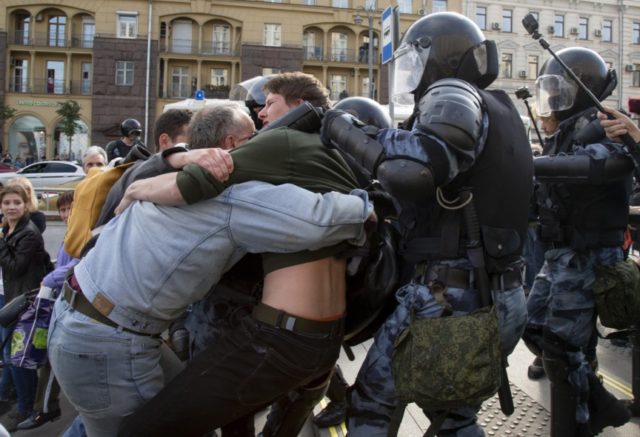Similarities between the protest movements in Hong Kong and Moscow have not gone unnoticed by the authoritarian rulers of China and Russia.
Russia’s state-run Tass news service on Wednesday quoted the new Chinese ambassador calling for the two countries to “cultivate our relations at a higher level” and “open a new page” in their friendship.
The new ambassador, former vice foreign minister Zhang Hanhui, was dispatched to Moscow on August 10 to replace ten-year veteran Li Hui. Zhang described his new assignment as a “dream come true.”
“I know that Chinese-Russian relations are very important relations. They are important not just for our countries, but for maintaining peace and stability on a global scale. We will work together, aim joint efforts to make relations between our countries and our peoples closer and implement the agreements reached by our leaders to take our relations and mutually beneficial cooperation to a qualitatively new level,” he said upon arrival.
Zhang issued a warning from Moscow on Wednesday that Hong Kong is not “American” or “English” but Chinese, so the U.S. and U.K. should not “stick their noses in our affairs.”
Russia and China have both accused the United States of meddling in their politics by supporting protesters. The Russian Foreign Ministry complained that a travel advisory from the U.S. embassy in Moscow was actually a thinly-veiled advertisement for protest marches that were deemed illegal by the Russian government. Beijing frequently portrays the Hong Kong protesters as puppets or dupes of American foreign policy and was enraged by reports of an American diplomat meeting with protest leaders.
China Daily anticipated Zhang’s appointment “shows the priority China places on robust coordination with its neighbor as well as its commitment to policy continuity.”
The Chinese paper praised growing strategic coordination between China and Russia, including new joint airspace patrols in Northeast Asia.
“Both nations are faced with factors that challenge globalization and multilateralism, and they both must confront rampant terrorism and extremism,” analyst Ji Zhiye told China Daily.
Writing at the Business Times of Singapore on Wednesday, Gideon Rachman noted that Russia and China “represent the major geopolitical and ideological challenges to Western liberalism,” but neither of them seems able to vanquish democracy. Rachman continued:
The bravery of the Moscow protesters reminded me of the students and young professionals I met in Hong Kong. They know that arrest and imprisonment could blight their futures, but keep turning out at demonstrations. The youth of the protest movements is noticeable. As one veteran Moscow liberal put it to me: “I’ve been to every anti-Putin rally for years and normally I know everybody – but I’ve never met these kids.” In Hong Kong, polls suggest that anti-Beijing sentiment is strongest among the young.
Both movements have a leaderless, Internet-based quality, which makes them hard to control. In Hong Kong, the demonstrators have adopted a slogan from the martial arts legend Bruce Lee, “be water”, to encourage protesters to avoid static and predictable tactics. In Moscow, the arrest of almost the entire circle around Alexei Navalny, the most prominent opposition leader, has not stopped the protests.
The grievances of the protesters about phony democracy are also strikingly similar. The Moscow demonstrations were triggered by the authorities’ decision to ban all independent candidates from running in city elections this September. Many in Hong Kong believe a turning point was reached in 2016, when elected politicians were banned from the city legislature for disrespecting a loyalty oath to China.
The U.S. ambassador to Russia, Jon Huntsman, announced his resignation in the same week after serving two and a half years in what he called a “historically difficult period in bilateral relations.” Huntsman, formerly governor of Utah, is said to be planning another run for that office.
President Donald Trump is reportedly considering Steve Biegun, previously chief negotiator for North Korean nuclear disarmament, as Huntsman’s successor. Biegun’s portfolio includes corporate experience with international relationships that would be useful in restoring the damaged trade relationship between the United States and Russia.
Rebuilding that relationship will become more politically difficult if brutal tactics are employed to suppress the Moscow protesters, who are smaller in number than those in Hong Kong but have proven remarkably determined to fight the exclusion of independent candidates from upcoming elections.
China is likewise embroiled in a trade war with the U.S. and could become even more economically isolated if it crushes the Hong Kong protest movement, not to mention the damage to trade that could result from ruining the city preferred by foreign business interests. Russia offered in June to help fill the “food gap” created in China by the trade war and a swine flu outbreak. The world’s two great strongholds of authoritarianism may increasingly be obliged to rely upon each other if the rest of the world grows reluctant to deal with them.

COMMENTS
Please let us know if you're having issues with commenting.